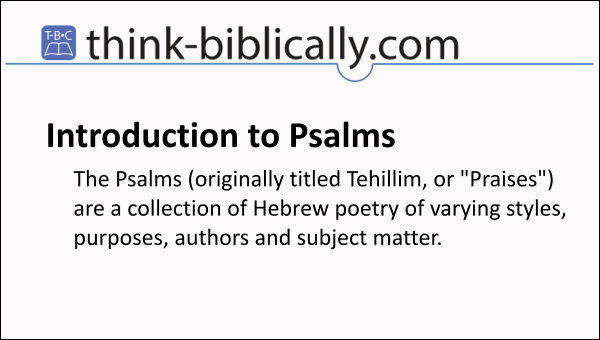By Tyson Thorne

The Psalms (originally titled Tehillim, or "Praises") are a collection of Hebrew poetry of varying styles, purposes, authors and subject matter. Some were written in time of crisis, others for the purpose of public praise, some for personal worship and some for community remembrance. There are many types of psalms and different literary rules for properly studying their intent and purpose. Whole books have been written on the varying types of poems we find in the collection and how to read and understand their proper intent, which can be fruitful and satisfying. There are 10 types of psalms that have been identified by scholars:
- Creation Psalms
- The Psalm of Descriptive Praise (Hymn)
- Enthronement Psalms
- The Community Psalm of Lament
- The Individual Psalm of Lament
- Liturgical Psalms
- The Community Psalm of Narrative Praise
- The Individual Psalm of Narrative Praise
- Royal Psalms
- Wisdom Psalms
That said, millions, perhaps billions of people have read through the book without such aids and found common ground and comfort and experienced joy in praise and worship. One doesn't need to be a literary scholar to appreciate their beauty or their message. Should you want to delve deeper into their structure and meaning, however, Think-Biblically.com highly recommends Claus Westermann's The Psalms: Structure, Content & Message.
If you choose to forgo using interpretive guides keep the following in mind: (1) the psalms are prose, not narratives so it is best to understand them as such; (2) most of the psalms were written early in Israel's history, before the prophets, so be careful not to read New Testament theology into these writings; (3) many psalms have explanatory notations at the start to help us understand their context — use them.
Author and Date of Writing
As far as authorship is concerned, we can attribute at least 73 psalms to David, 12 to David's court musician Asaph, 10 by the sons of Korah, two by Solomon and one from Moses, from Heman and from Ethan. For the remaining third the author cannot be determined.
Due to the multitude of authors, the date of writing ought to be determined for each psalm independently, for they span a time-frame of a little over 1,000 years. The vast majority of them, however, were written during the period of the united kingdom under the rule of king's David and Solomon.
Structure of Psalms
Book One: Psalm 1-41
Book Two: Psalm 42-72
Book Three: Psalm 73-89
Book Four: Psalm 90-106
Book Five: Psalm 107-150
